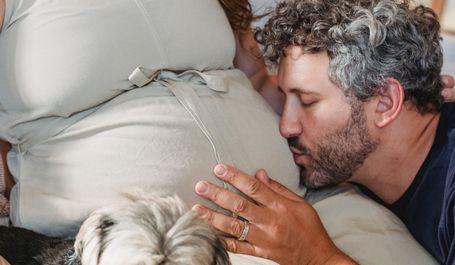
Blog #5 | Supporting Dads after miscarriage and baby loss
13 January 2021
When a baby dies either in utero (in the womb) or after birth, the world loses a shining star and society is thrown into a kind of embarrassment for not knowing what to say to the grieving parents.
There are those who send flowers and cards simply saying, “I am sorry for your loss”. There are those who say nothing. There are those who are uncomfortable and simply don’t know how to act, so they push their uncomfortableness back onto the grieving parents with a throwaway comment like “well, at least you know you can get pregnant” or “you can always try again”. (Urgh… this is a whole other blog post in itself – what NOT to say to grieving parents after the loss of a baby!!).
My boss told me to ‘take as much time as I needed’ and luckily for us, my partner was also supported by his boss, but I would imagine there are many couples who are faced with the dad being expected to go back to work the following day – like nothing had happened. Well, at least not to him anyway?!
For those of you who understand, a miscarriage isn’t ‘just losing a bit of blood’ – the physical side is all about coping with actual labour pains, passing clots the size of golf balls and in my case suffering from severe haemorrhaging due to clots stuck in my cervix, and of course eventually passing the baby. And then there’s the emotional side to it - all of which was just traumatising. My partner required more time off from work (using his holiday leave) as it was such a distressing time for us both and I needed him to be close to me. Once again though, the focus of the doctors, family and friends was mainly directed towards me; yet he had lived through those horrific moments too – not only witnessing me pass our baby and seeing how truly scared I was, but also him needing to be strong for us both.
In the weeks that followed, we received ‘thinking of you’ cards and text messages addressed to both of us (from the few that had known about our pregnancy) which was comforting. A wave of flower bouquets turned up at our door, day after day, which was heart-breaking to be reminded again and again of our loss. Everyone was asking how I was coping and how I was feeling. Yet I remember mostly thinking how odd to only ask about me. I made sure I kept asking my partner how he was – as nobody was asking him. It was his baby too.
Why, when we lose a baby, do the dads get forgotten about?
Yes, the focus is predominately on the mother as they go through the physical pain, but I think it’s important to remember that dads are going through their own heartache and pain. Their hopes and dreams are ripped away from them in that moment too. Not to mention, they feel completely useless by not being able to make things better for the and yet they seem to get totally overlooked. Their feelings of loss and pain and sometimes trauma is forgotten about which can also lead to mental health issues.
We’re learning more and more each day about how men’s perinatal mental health is becoming increasingly forgotten about - with 1 in 10 dads becoming depressed either during pregnancy, birth or in the first 12 months after birth or loss, and 10% of dads experiencing birth trauma symptoms. I’ll share a separate blog about PND in dads later this month, but for now, here’s some further support for dads:
- Visit Fathers Reaching Out run by Mark Williams, campaigner, speaker and writer.
- From Dads to Dads is an amazing resource full of questions dads want to ask but feel they can’t. There’s a great blog on here to read too
- The Hub of Hope is a national mental health database, bringing help and support together in one place, with a focus on grassroots organisation.
- ANDYSMANCLUB is a non-judgmental, talking group for men.
- DadsNet offers support and knowledge through a community of dads on practical parenting and fatherhood.
- The Campaign Against Living Miserably (CALM) is leading a movement against male suicide, the single biggest killer of men under 45 in the UK.
© Copyright. All rights reserved.

